
foreword | Historical Narratives | Resources | Links | Contact
THE SWORD TO SETTLE
History is the active force in the struggles of every generation..
The following resolution was made on June 7, 1776 and approved by the Continental Congress on July 2.
"That these United Colonies are and of right ought to be free and independent States; that they are absolved of all allegiance to the British crown; and that all political connection between them and the state of Great Britain is, and ought to be, dissolved."
On July 2nd, 1776 the American Congress formally declared the independence of a new nation called the United States of America. On July 4th a final vote was taken without dissent on the issue of independence. although New York abstained from voting. Independence day was declared to be July 4th. The signing of the Declaration of Independence, which did not occur immediately but took place over many months, was engrossed on parchment signed by fifty-six members. John Hancock"s signature was the first and largest. The last to sign in 1781 was Thomas McKean whose name is the final one in the 4th column of signatures. McKean voted for independence but was with Washington's army and did not get around to signing the document until much later.
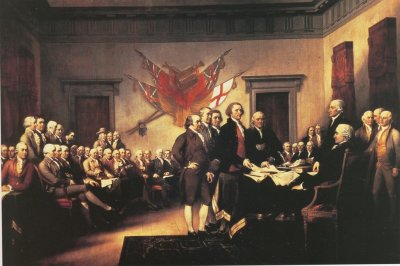 |
|
[John Adams, Thomas Jefferson, Benjamin Franklin & others present the Declaration of Independence to the president of the Congress, John Hancock. |
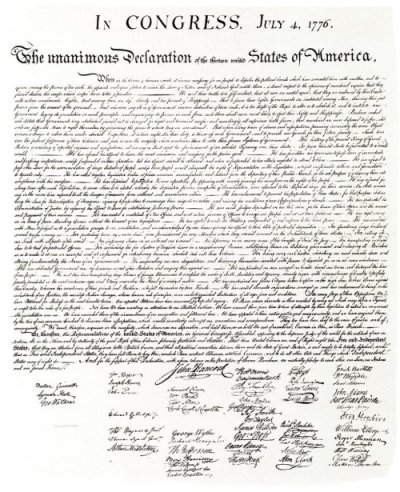 |
|
Declaration of Independence |
The rebels proceeded to wage war and the armies moved into action. Britain's Canadian colony was about to be besieged by an American force dispatched by George Washinton and according to Benjamin Franklin, the outcome augured ill for both Britain and Canada.
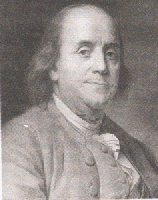 |
|
Benjamin Franklin |
In His Own Words
"I cannot but lament the impending calamities Britain and her Colonies are about to suffer. When passion governs she never governs wisely."
In this civil war, "a fratricidal conflict characterized by ruthless and undisguised brutality," the Lower South, in particular, was ravaged as no other section of the country. Its government processes collapsed, justice was non-existent and society disintegrated to the point that it approached what John Locke called, "the savage state of nature." Partisan bushwhacking warfare kept the South ablaze for several years, with savagery, plundering forays and atrocity killings of surrendering men by both sides.,
The declaration instantly converted mobs into militiamen and raised violence to a new level. Once the ties to the sovereign were formally severed, loyalty to the crown became treasonous with all the penalties and punishments that that entailed. A certified oath of loyalty became compulsory in the former colonies and no citizen was safe unless he/she had such a certificate in their possession. Any person without one became a fugitive with neither rights nor recourse to the law. Declining to pass the patriotic test subjected one to every kind of civil disability and to the indignity, injury and spoilation of the mob.
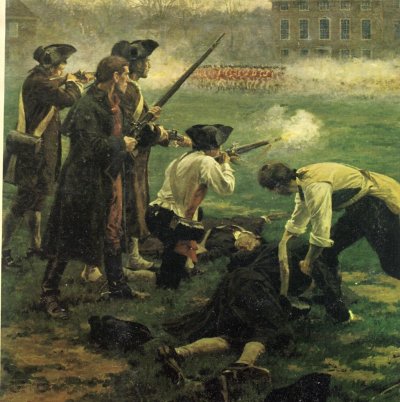 |
|
American Revolutionary War |
On the other hand possession of this certificate signified support for the founding and fostering of American independence and any individual found with it by British authorities was liable to conviction of treason against the Crown of Great Britain. History is different out of different books. While Americans were labeling Loyalists treasonous, Britain was calling for the conviction of seditious patriots and never the twain shall meet. An American patriot wrote to an American Loyalist who had been a classmate and close personal friend,
In His Own Words
"You have forsaken your Father's house and your friends and gone to join those savage and unnatural destroyers of Our Country."
The patriots were outraged that any American would support Crown over Congress. A blind fury burst forth against those who supported the sovereign and any refusal to fight for independence, whether friend, son or sibling were to know the vengeful wrath of the rebels. This vengeance intensified after the British sovereign decided that the "sword alone"would have to settle the score with the rebellious Americans. "Neighbour was against neighbour and father against son," and any who refused to fight in the cause of the Congress, whether friend or relative, was labelled "an infamous villain" and dealt with harshly. Loyalists were thought to be traitors who were aiding and abetting dangerous enemy. They were "friends of corruption, oppression and unfreedom." When the sword was drawn, the two sides became irreconcilable foes and fought in ferocious fashion. The partisanship of Patriot and Loyalists knew neither class nor colony. It became a war to the knife, often fought in guerilla-style in remote and isolated areas of the colonies, distant from the regular fighting forces. Congress labelled Loyalists criminals, not prisoners of war, a designation that led to torture and lynching.
In Vermont a "liberty commission" decided to build " a sufficient Goal" on the west side of the range of Green Mountains in order "to secure Tories." Committees of Safety and Commissioners of Sequestration were formed to "take into their custody all estates of inimical persons who had heretofore or that might thereafter be by sufficient evidence proved to be harmful to the American cause." The estates of "enemies of the friends of America," that belonged to persons guilty of "high treason and other atrocious crimes and against treacherous conspiracies," were to be seized and sold at public auction with the money used to furnish the sinews of war, that is, to finance the fight against the British. Once this proposal was implemented the treasury began to fill up fast.
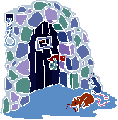 |
|
Goal |
George Washington was relentless towards all Loyalists or "internal foes" as he called them. In a letter to Major General Charles Lee, Washington's third in command, Washington commented on the ill treatment Loyalists received at the hands of Haligonians when they fled to Halifax to escape American patriot vengeance. Because they were so badly received there, many returned to Boston, prompting the patriots to decide, according to Washington, "to send them immediately back as the properest and the severest punishment they could inflict. But death being preferred to this these Loyalists now await punishment that may be thought due to such parracides." The fact that two-thirds of the property in New York belonged to Tories he found insufferable.
Loyalist John Vassall, a resident of Cambridge, feared for his life and the lives of his family fled to Boston and abandoned one of the largest, most elegant homes in town with all its fine furnishings. It was a grey clapboard Georgian mansion half a mile from the King's Highway. Three stories tall with an unobstructed view of the Charles River, the mansion was perfect for Washington, who was fond of handsome architecture and river views. [*] With his office in a drawing room off the front hall, it remained George's headquarters though the siege.
Washington, who was temperate in his judgement of most matters, was bitter about the Loyalists whom he loathed. "They are,"
In His Own Words
"detestable parricides and unhappy wretches and deluded mortals, a great many of whom ought to have long ago committed suicide." This bitter outburst tended to confirm Thomas Jefferson's assertion that Washington had a wild temper and sometimes "got into one of those passions when he cannot command himself." When Washington retired, Jefferson, who was no great admirer of the first president, declared that Washington was fortunate to get off just as the bubble was bursting leaving others to hold the bag.
John Adams, who became the second president of the United States, declared
In His Own Words"I would have hanged my own brother had he joined the enemy."
There were those on both sides of the fratricidal struggle known as the American Revolution who did just that. The conflict was one in which the bitterest and the harshest of human emotions were aroused - a civil war within a state. "A brother offended is harder to be won than a strong city," goes the saying. The following account documents the hatred engendered by this struggle. In a covering party one day, a father and one of his sons were serving as sentries with another man, when a rebel rifleman dropped the man. In so doing, the rifleman exposed himself to fire and he was instantly dropped in his turn by the unerring aim of the father. The old man, as a matter of course, went up to rifle his victim and on examining his features discovered that it was his own brother. Under any circumstances this would have horrified most men. Tragically, not in this instance. Savagery forsook sanity and without anguish or remorse, he took his brother's few possessions: an old silver watch, a clasp knife and his rifle. As he did so, he coolly and casually commented, "It serves him right for fighting for the rebels, when all the rest of our family are fighting to support our Sovereign."
Both sides were relentless in their savage treatment of any who opposed them. The persecution of colonial Loyalists was widespread and wherever the rebel cry of "Liberty and Property" was heard, it was followed by the plunder of Loyalist possessions. Need, greed and fierce hostility resulted in the wholesale confiscation of Tory property. After Congress classified any opposition to the colonial cause as treasonous, looting became legal and the maltreatment of Loyalists by radical rebels grew ever more vicious. There was no appeal from their actions for courts of law were closed and judges were prevented from fulfilling their judicial functions. No class of persons was safe from the avenging rebels.
Tarring and feathering the "odious Tories" was a favourite torture. The tar was heated before the victim so that he might see in its bubblings, the pain that would engulf be him momentarily. The poor wretch was stripped to the waist, then the hissing, spitting, black, hot tar was poured over his shoulders, his chest and his back blistering and shrivelling his skin as he howled in pain. A little or a lot was poured over his head which could cause blindness in one or both eyes. As onlookers cheered as feathers were dumped over him and he was paraded around town on a rail by frenzied mobs. Getting the stuff off was even more painful.It took hours to peel the hardened tar from the man's body, the flesh torn off with the tar. Skin injuries were unavoidable and infection was certain to follow.The barbarous and disgraceful practice of tarring and feathering and of carting Tories in a cart about town had become a popular spectacle. Another insidiously savage torture was "spicketting." The victim was bound, stood with one foot on a sharpened stake and then whirled around literally screwing the stake into his foot, quite often crippling the poor person for life.
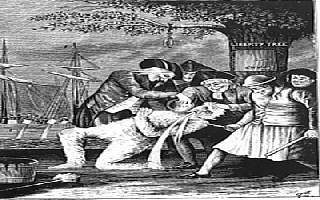 |
|
Tarring and Feathering |
Such lawlessness was often aided and abetted by the revolutionary leaders. One such group, the Congress of New York, ordered the committee of public safety to secure all "the pitch and tar necessary for the public use." When one American officer attempted to stop some Sons of Liberty from torturing Tories on rails in the streets of New York, Washington himself reprimanded the officer, declaring sternly that "only an enemy of his country" would attempt to discourage this practice. Imprisonment, banishment, even death were acceptable forms of punishment for Loyalists, often simply to set an example for the more timid Tories who might be wavering. Some Loyalists were summarily shot in cold blood, while others were hanged. "Nothing," wrote one rebel Governor, "can be more effective than a few more executions." As soon as the last British warship left Charleston harbour, twenty-four Loyalists were hanged on gibbets facing the sea.
This savage behaviour was not one-sided, for Loyalists reciprocated with violence in full measure. While many were undoubtedly driven to their fierce defence "by the most barbarous persecution," some were motivated more by a brutal passion for reprisals that was more vicious because their enemies were often former friends or even members of the same family.In the southern states where their number was greatest, Loyalists joined in pillaging raids against their patriot neighbours. The ties that bound neighbours had become as deadly as a noose. Around this time the "lynch law" received its name from a Virginia planter named Charles Lynch, who during this troubled period hanged British sympathizers up by the thumbs until they shouted "Liberty forever."
John Butler and the Royal Greens, a tough, callous corps of Loyalists, joined Joseph Brant and his Mohawk warriors and together, they cut a savage swath through Upper New York. Brant's enemies called him 'The Monster Brant' whose name was "terrible in every ear." His Mohawk kinsmen named him Tyendinaga, a warrior who fought his first battle at the age of thirteen. To his British allies, he was Captain Joseph Brant. American historians described the warfare they waged as "treacherous, barbarous, and diabolically wicked and cruel." Others said that frontier warfare was always ruthless, and that there was little evidence to show that Brant, Butler and their followers made it even more so. Some writers claimed they acted with restraint and humanity.
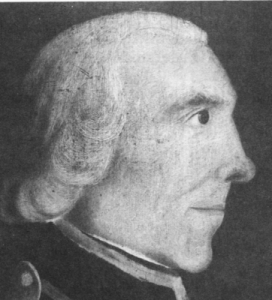 |
|
John Butler |
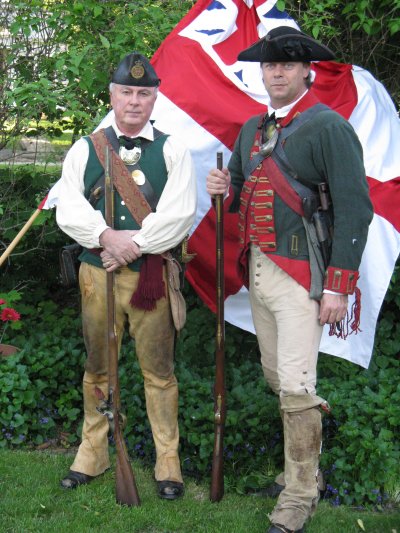 |
|
Two accurately depicted uniforms of |
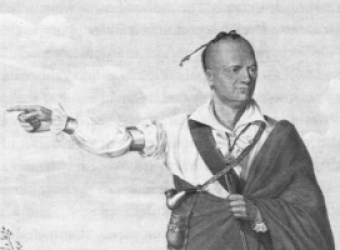 |
|
Joseph Brant |
There is less debate about the brutal raids of another British leader whose name inspired dread and loathing. Because of his raids through he was feared and hated throughout the Carolina countryside. Banastre Tarleton, portrayed below as a dashing cavalry captain was a twenty-five year-old able and audacious leader who was brave, cruel, cunning, vain, agumentative and well-deserving of the negative comments about his nefarious character and activities. The Oxford-educated son of a Liverpool merchant commanded a mixed force of cavalry and light infantry, a Loyalist force known as the British Legion. He was unmatched on either side for alertness, dash, daring and vigor of attack. He was also "cold-hearted, vindictive, and utterly ruthless and wrote his name in letters of blood all across the history of the war in the South." 'Butcher' Tarleton's victories came in devastating succession.
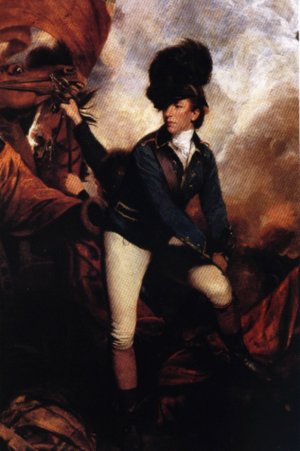 |
|
Banastre Tarleton |
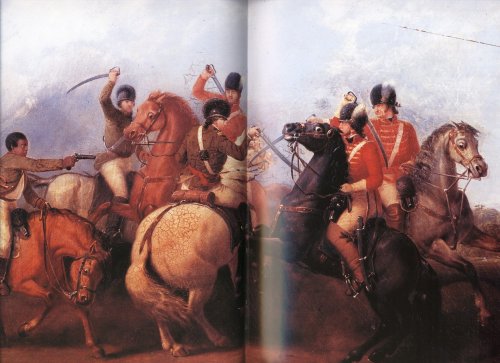 |
|
Banastre Tarleton on black horse in head on clash. |
Tarleton, who bragged of his ruthless activities, was greatly admired by his troops. The sadistic British officer featured in the imaginary historical movie, The Patriot was based broadly on Tarleton. Although the movie was a fictional fantasy the people of Liverpool vigorously objected to this savage depiction of their native son. Despite their protestations Tarleton was one merciless man. At Waxhaw on the border of the Carolinas, Tarleton's British Legion battled a regiment of Virginian infantry. Loyalists' sabres had wreaked chaos on the rebel forces, leaving them a cringing powerless throng. In desperation they raised the white flag of surrender and troops grounded their arms. Tarleton refused to stay his troops, the bearer of the white flag was "instantly shot down," and Tarleton's Legions fell upon the Americans, their cries for quarter answered with slashing, stabbing steel.The carnage that followed resulted in the expression "Tarleton's Quarter" which became synonymous with the relentless slaughter of surrendered men. This fight known as the Waxhaw Massacre inflamed the hatred and heightened the struggle between the American "cousins." Tarelton returned to England in 1782, the year in which Joshua Reynold's painted his celebrated portrait. He became a Member of Parliament for Liverpool in 1790. Granted a knighthood and promoted general in 1812, he died in Shropshire in 1833.
Another patriot nemesis was the turncoat, Benedict Arnold. Acknowledged by rebel and royalist alike as a general of the highest ability, Arnold's betrayal of the rebel cause alarmed the Americans like no other event in the Revolutionary War. Arnold was a man of immense physical strength and courage. The swarthy, rough-tongued renegade had a sharp mind and a highly self-confident manner. He led southern Loyalists and conducted "thunderous excursions" inflicting devastation over wide areas of the country.
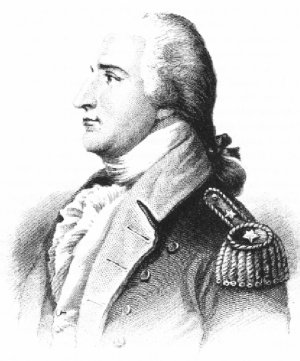 |
|
Benedict Arnold |
These early British victories emboldened a number of individuals who had been latent Loyalists, to emerge from cover and vent their rage on the rebels. From the Atlantic Ocean to the Blue Ridge Mountains, there were raids, riots and murders most foul, as various factions fought to settle old scores. Then came King's Mountain. One thousand Loyalists were surrounded by rebel frontiersmen on a spur of the Blue Ridge Mountains. With bayonets bared the Loyalists charged the buckskin-clad sharp-shooters, only to be decimated by their faultless fire. When a Loyalist officer rode out with a white flag, "his saddle was suddenly emptied."
Shrieking, remember 'Tarleton's Quarter,' the rebels strolled among their former fellow-countrymen shooting the wounded and any who tried to surrender. A few were taken prisoner and they were treated with "an inhumanity scarcely credible." This included hanging nine found guilty of treason at a drumhead court-martial. Depending on the nationality of the historians, this event is known either as the Battle or the Massacre of King's Mountain.
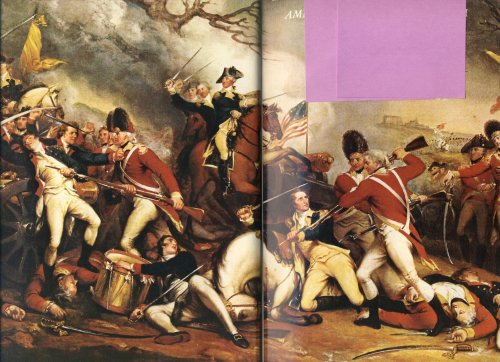 |
|
Liberty Bought With Lives |
The "accursed, cruel, unnatural, wicked American war" was finally ended by the Treaty of Paris on 3rd September, 1783. Loyalist Americans were astonished that Britain had been beaten by a bunch of rebels. If at the outset a powerful blow had been struck, the revolution might have collapsed. But this never occurred and when France joined the fray it was the stubborn colonists and their leaders that led to the British defeat. It could be said that Britain, like Mark Anthony, "was a Roman by a Roman valiantly vanquished."
The civil war between neighbours of the same faith, race and blood resulted in havoc and wholesale confiscation of possessions and property. Loyalists knew the temper of the times would result in a bitter backlasha and it grew grow worse with each passing day. They were seized with despair and bewilderment. Ruined economically and outcast socially, Loyalists found themselves destitute and helpless in their homeland.When British troops withdrew at the close of the war, those who had supported their sovereign found life in the states unendurable, and they either melted into the countryside or moved away. A flash flood of humanity sought safety in flight to various British colonies, some ten thousand of these "exiles from their father's land" trekking to Canada. Those who fled included rich and poor, opportunists and idealists, farmers, bankers, soldiers and shirkers.
At the beginning of the revolution these people had opted for the status quo, that is, passive support for their sovereign. Loyalists lacked leaders which they did not believe they needed. Loyalism was not a burning belief. It was rather an absence of belief. Loyalists never in their wildest imaginings doubted the outcome of any contest between the Crown and Congress. For a long time they saw no need for developing or proclaiming an alternative to independence so they did nothing. They were smuggly certain that God was on their side and that sooner or later right would prevail. The forces of the king would step in and settle these few seditious fools. It is difficult to beat something with nothing, however, and Loyalists discovered when the guns began to go off that they were dealing with a force to be reckoned with. Tom Paine stated their case clearly when he proclaimed in his book Common Sense, "The period of debate is closed. Arms as a last resort must decide the contest against a hardened, sullen-tempered Pharaoh. Of more worth is one honest man to society in than all the crowned ruffians what ever lived."
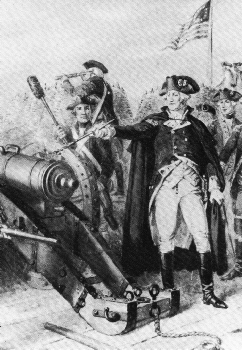 |
|
Washington Firing the First Shot |
To their astonishment Loyalists discovered that they had chosen the losing side. As a result they were forced to flee in the face of their embittered, outraged fellow countrymen and sought safety from pillage and persecution by heading north. They poured across the border in small boats, large ships, carriages, canoes, on horseback and on foot. En route many died of disease or despair; others were victims of the bullet, bayonet or tomahawk. It was not long before some of the exiles voiced regret at having made the wrong choice, and they were quick to show their chagrin. Upon arriving in New Brunswick, one lamenting Loyalist candidly confessed
In His Own Words"I have made one great mistake in politics for which reason I never intend to make so great a blunder again."
Rumours were rife that they were heading into a grim wilderness, where winters were long and cold, causing many to wonder whether they would be able to bear the savage rigors of General Weather and the harsh realities of Colonel Wilderness. The lonely settlements seemed like the last outposts of the civilized world, their homes shared with wildlife that included wolves, bear, deer, passenger pigeons, field mice and swarms of mosquitoes.
Complaints were heard regarding mismanaged plans for their reception, and some began to have second thoughts about sacrificing the life they'd known and lands they'd owned for loyalty to a king who seemed indifferent to their plight. Agents from the United States added to their anguish, by doing everything they could to stir up discontent and discord among them. American rebels took delight in telling the Loyalists they would receive their just deserts in a bleak land where they would "drag out the residue of a life more intolerable than death."
Evidence of the agents' success was the unheralded return to the new republic of a number of disillusioned Loyalists, who believed they had made a mistake, and were determined to correct it as soon as possible. Most, however, soldiered on, wearily seeking assistance from the only source available: the government.The British commander-in-chief, Lord Carleton, was inundated with petitions seeking sustenance. "If we have to encounter this inexpressible misfortune, we beg consideration for our lives, fortunes and property and not by mere terms of a treaty."
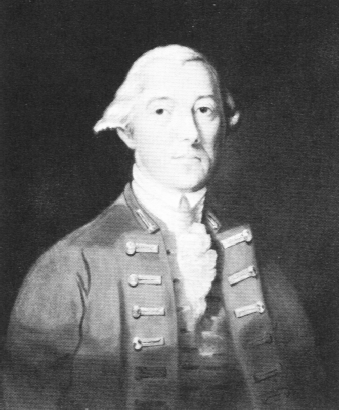 |
|
Sir Guy Carleton |
Carleton sympathetically received these
In His Own Words
"Brave, unfortunate people many of them of the very first families, reduced to a condition that makes one's heart bleed." It became his chief preoccupation to defend their cause and see to their safety and survival.
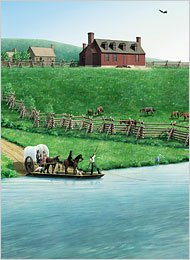 |
|
George's Family Homestead |
"A rendering of George Washington's family house and surrounding land at Ferry Farm in Stafford County. Researchers announced Wednesday that remains excavated in the last three years were those of the long-sought dwelling, on the old family farm in Virginia, 50 miles south of Washington." [Washington Post, July 4, 2008]
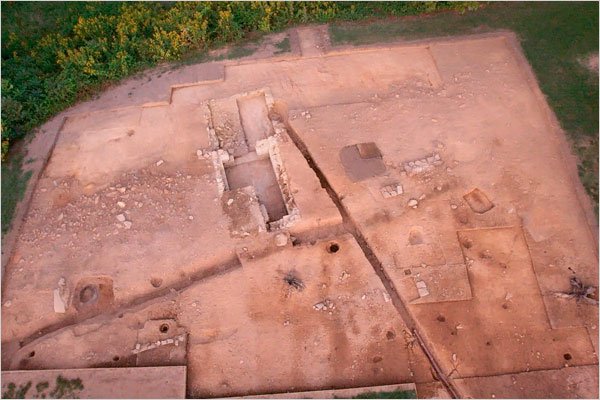 |
|
Foundation of Washington's Family Homestead |
 |
|
Washington's Mother's Ashbury Ceramic Tea Pot Top |
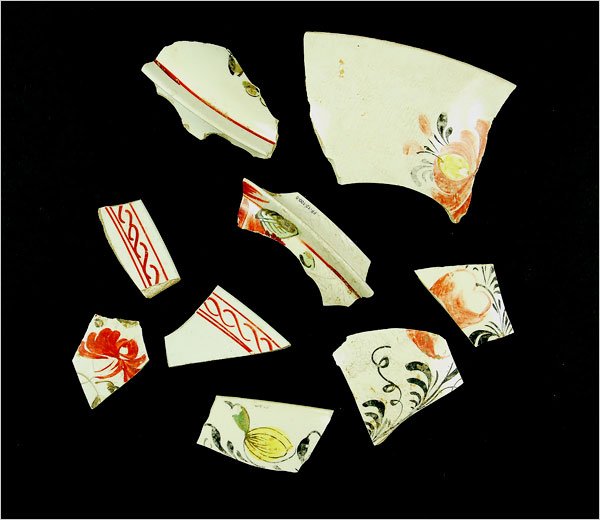 |
|
Remnants of Washington's Mother's Wedgewood Tea set |
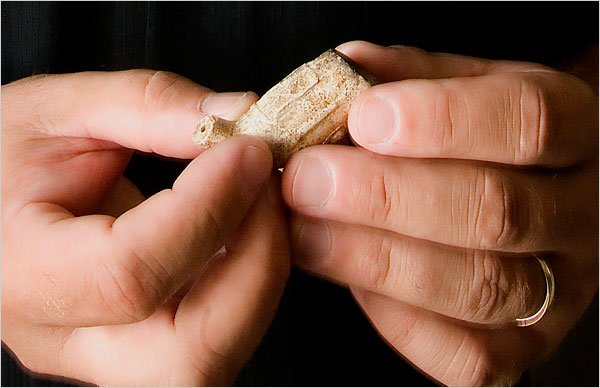 |
|
George's Clay Pipe bearing a Masonic Crest |
Copyright © 2013 Website Administrator